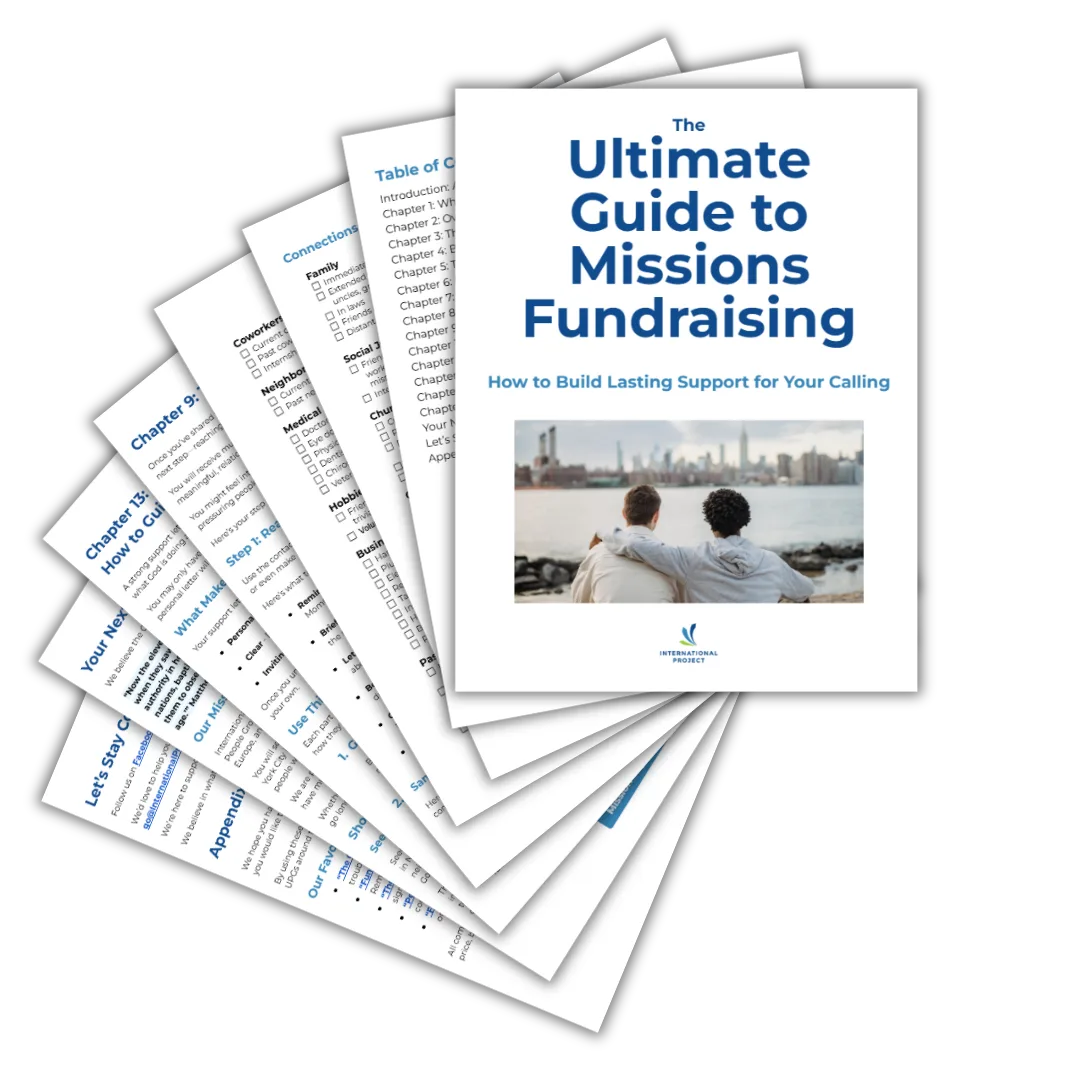What is tentmaking? That is the thought going through my mind when my engineer friend (now my husband) said, “I want to be a bivocational tentmaker.” I believe my response went something like this: blink, blink, blink.
Tentmaking? Tentmaker? My imagination wandered to working for companies like REI, engineering tents for extreme weather or something. Or maybe it was the male codeword for “homemaker.”
Without trying to sound stupid, I timidly asked what all was entailed in being a tentmaker. I found out I was quite off the mark. Way off actually.
This blog will teach you about tentmaking in Bible times and what it looks like now.
It will help answer your questions about the Apostle Paul tentmaking in the Bible, such as:
- What is a tentmaker in the Bible?
- Was Paul a tentmaker?
- Why did Paul work as a tentmaker?
Read on to learn more about how you can become a tentmaking missionary!
What Is Tentmaking?
When the concept of a missionary meets a “normal” job —tentmaker ministries are born.
Being a tentmaker or bivocational missionary means following God’s call to have a part or full time job, while also engaging in active Christian missions, like evangelism and church planting.
Traditionally, mission work is a support raised ministry. Telling people about the Good News of Jesus is your sole job.
However today, with the increasing difficulty to get into predominantly non Christian countries, people (evangelists) need to have some sort of legitimate job or business to even enter the country.
In some cases, a tentmaker can more easily enter closed countries. Once there, they will also have unprecedented opportunities to share the Gospel. through the prompting of the Holy Spirit.
In other cases, a tentmaker provides for him or herself instead of raising support.
Workers in the field who have both a full time job and serve as a missionary are tentmakers or bivocational missionaries.
Well, in reality, the profession comes from doing just that: making tents. However, the modern use of the word, especially in the missions world, tentmaking points back to a concept we first see in the New Testament.
In the first century, Paul had a job (tentmaking) by which he made a living and built connections in the community, while also preaching the Gospel.
The Apostle Paul was a tentmaker. Paul provided for himself at certain times by making tents, but this was not his first priority.
Related: Feeling overwhelmed by how missionaries raise support? Check out our free eBook here!
Paul’s calling and focus was always as a missionary and church planter first. As we look at Scripture, we see that Paul actually viewed tentmaking missions as a way to further the Gospel.
Tentmaking in the Bible
The Apostle Paul’s tentmaking was an important part of his missionary journey. Throughout his ministry, we see Paul worked to support himself as a tentmaker in the Bible.
At other times, Paul relied on the financial support of others. For instance, in Philippians 4:14-18, Paul expressed gratitude to the church at Philippi for the gifts and aid they sent him.
Related: Missionary Fundraising
In Acts 18:3, we read about the Apostle Paul working as a tentmaker in Corinth..
The Bible says that Paul was:
- Going to the synagogue each week
- Preaching the Word to Jews and Greeks on the Sabbath
- Telling them about Jesus Christ the Messiah
The story of Paul tentmaking for self support in Acts 18 is where the term originated. Hence today, tentmaking means to have a job or while also doing intentional Gospel sowing in the surrounding community.
While Acts 18:3 is the only verse that explicitly mentions Paul the tentmaker, he refers elsewhere to working with his hands to support himself and not burden others:
Similarly, Paul references his bivocational work in 1 Corinthians 4:12, “We work hard with our own hands…” (NIV).
Here are some of the cities where it appears that Paul was a tentmaker in the Bible:
Corinth
The most famous passage on tentmaking (Acts 18) is the story of Paul’s tentmaking in the city of Corinth.
Tentmaker Paul worked alongside Priscilla and Aquila. This couple were early Christians who were forced to leave Rome when Claudius expelled the Jews there.
When he was rejected by the Jews, Paul focused on preaching the Good News of the Lord Jesus to the Gentiles.
Ephesus
Acts 20 recounts Paul speaking to the elders of the Ephesian church.
Paul spoke these words while in Miletus about his time in Ephesus, “You yourselves know that these hands of mine have supplied my own needs and the needs of my companions” Acts 20:34.
The implication here is that Paul supported himself as a tentmaker while in Ephesus.
Thessalonica
In his letters to the church in Thessalonica, Paul addresses his season of tentmaking ministry.
He writes in 1 Thessalonians 2:9, “Surely you remember, brothers and sisters, our toil and hardship; we worked night and day in order not to be a burden to anyone while we preached the Gospel of God to you.”
In 2 Thessalonians 3:8, Paul also reminds the church, “…nor did we eat anyone’s food without paying for it. On the contrary, we worked night and day, laboring and toiling so that we would not be a burden to any of you.”
Both of these passages allude to Paul’s bivocational work as a tentmaker who did not rely on outside financial support in that season.
Now that you know what a tentmaker (also known as a bivocational missionary) is, let’s see what gives tentmakers a unique advantage.
Is Tentmaking Effective?
Do tentmakers really have enough time to effectively do missions? It seems as though the time for ministry is much more limited with another job. At times this is true, but there are also many advantages.
Clear Status as Employer or Employee
Tentmakers have a legitimate reason to be in the community or country—work.
More often than not, foreigners coming into closed countries around the world are seen as very suspicious. Locals can think you’re someone to be wary of. Are you CIA or a missionary? Either way, you are suspect.
Similarly, for those working in Western contexts, the connections you make through your work can help you connect with immigrants, refugees, and international students.
Having proximity to them and working alongside them in everyday jobs creates organic opportunities to live your faith out loud. It raises less suspicion if you have another reason to be in their community.
Natural Ministry Opportunities
Jobs and businesses are natural inroads to the people. You may have employers or employees who now know you, with whom you can build trust, and who can see the way the Bible shapes the way you live and work.
As a co worker, you could even have opportunities to engage in devotionals or Discovery Bible Studies.
In fact, tentmaking has many advantages for quickly entering the community and connecting with the local people compared with traditional missionaries who must work at it, sometimes for several years.
Related: Business as Missions
Reduced Support Raising
Finally, having a job/business can potentially be a way to support you and your family on the field and not needing as much (or any) monetary supporters. This can enable you to remain on the field without the worry of raising enough financial support for your work.
It can even get you to the mission field quicker.
Now, I know what you are thinking:“I do not have to raise support! This is fantastic!” But a word of caution for this: God often leads us to be dependent on others and therefore dependent on Him.
If your sole motivation for tentmaking is to not have to do fundraising, it probably is not for you. Beware, as it can be a fear based motivation rather than a faith based motivation.
Learn more in our Ultimate Guide to Support Raising here.
Lastly, let’s see if tentmaking could be a good fit for you!
Is Tentmaking for You?
Take a moment to think through these questions honestly:
- Are you passionate about the Great Commission and telling people about Jesus?
- Do you want to see local churches planted among the Unreached People Groups both here in the US and around the world?
- Do you currently work as a skilled tradesman, professional, or perhaps as an entrepreneur?
If you answered yes to any of the above, perhaps tentmaking or bivocational missions is for you!
It often amazes me how the Lord can use all the skills He gives us for building the Kingdom of God.
Do not think for a second that God is not asking you to be a missionary because you are a chemist, an engineer, or a business owner. He uses people from all walks of life to reach the unreached as tentmakers.
Tentmaking is becoming more and more the only way to reach the people in countries where the Gospel is not known.
Check out our bivocational ministries page to see how you can get involved. We’d love to explore with you if God is calling you to be a tentmaker.
Discover Your Calling as a Tentmaker
Sign Up for More on Bivocational Tentmaking
God may already have given you the skills, career, and connections you need to reach the nations. He can use your everyday work to plant seeds of the Gospel among those who have never heard.
Sign up below to receive:
- Resources to help you take the next step toward missions in your current career
- Encouragement to live your faith intentionally in the workplace
- Guidance to help you discern God’s unique calling for you
Your career is not a detour—it may be your mission field. Let’s explore that vocation together.
Fill out the form now to access mission opportunities and next steps!
Sign Up For More Info
Get Bivocational Support
We respect your privacy.🔒 Your email will only be used to send bivocational missions info and our related updates—unsubscribe anytime!



